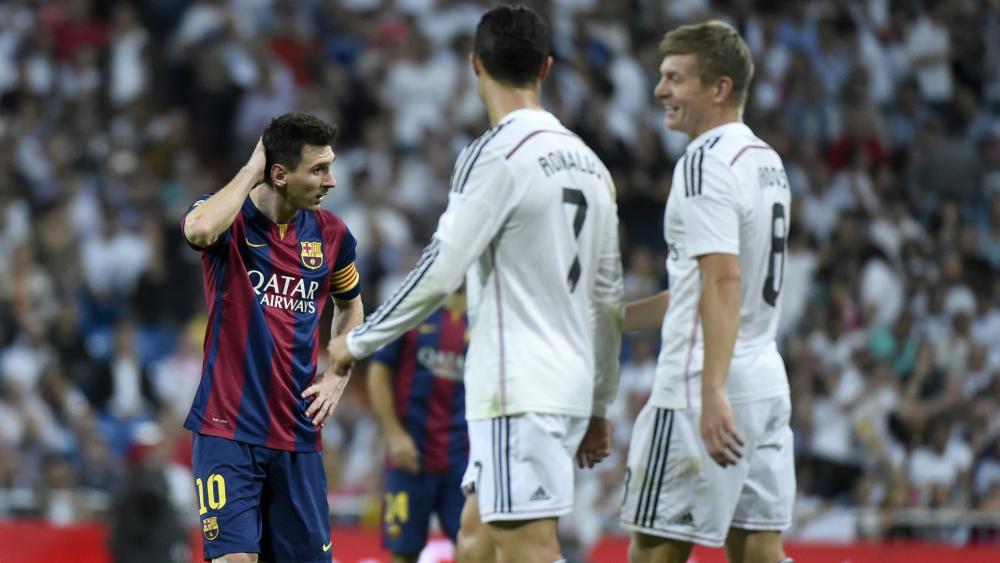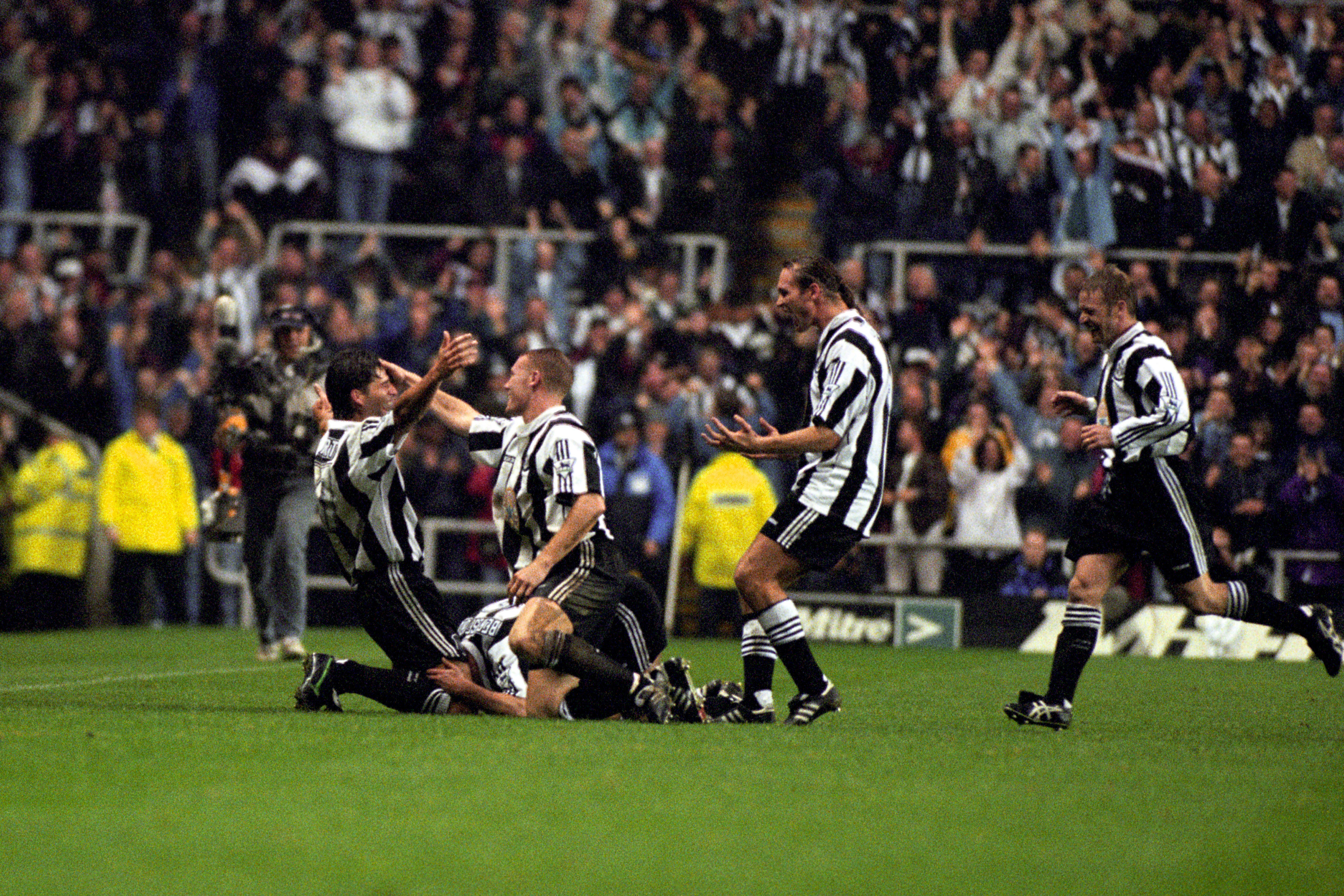Messi's major risk and a midfield minefield - the five keys to the outcome of El Clasico
Ahead of Saturday's Clasico, here are five key factors to the outcome of Real Madrid and Barcelona's first Liga meeting of the season.

The best features, fun and footballing quizzes, straight to your inbox every week.
You are now subscribed
Your newsletter sign-up was successful
Want to add more newsletters?
Join the club
Get full access to premium articles, exclusive features and a growing list of member rewards.
The most famous rivalry in club football resumes on Saturday at the Santiago Bernabeu as Liga leaders Barcelona visit second-placed Real Madrid.
Luis Enrique and Rafael Benitez - the latter preparing for his first Clasico as Madrid head coach - confirmed on Friday that they are likely to have full-strength teams to call upon, with Lionel Messi back in full training, Karim Benzema and Sergio Ramos available again and Ivan Rakitic and James Rodriguez showing promising signs of recovery.
As ever, talking points abound ahead of European league football's greatest fixture, from allegations of referee pressure to the form of Cristiano Ronaldo, but here are five issues which could well be key to deciding the first Clasico of the season...
Messi a major risk in more ways than one
Fans of both Barca and Madrid waited with bated breath to see if Lionel Messi would recover from a knee ligament injury in time for Saturday's game. In truth, the news from Luis Enrique was not entirely positive for either side: Messi is back in full training but remains far from 100 per cent fit, as is understandable after an eight-week absence, and will only start the game should he confirm he is ready.
Luis Enrique faces a difficult quandary. Fielding Messi at all - but especially from the first minute - represents a clear risk of an injury relapse which could damage Barca's season well beyond the Clasico. More crucially, his return threatens a greater defensive vulnerability: in the nine games Messi has missed, Barca have scored more (21) and conceded fewer (6) than in the previous 10 with the Argentinian in the side, and are enjoying a seven-game unbeaten run as well as a sequence of four consecutive clean sheets.
No one has more goals or assists in the Clasico than Messi, but with Rafael Benitez having vowed to attack from the off, playing La Liga's greatest goalscorer from the start could be a risk worth avoiding for the visitors - especially since a draw suits them better than it does Madrid.
The best features, fun and footballing quizzes, straight to your inbox every week.
Benzema must play - Ronaldo needs him
Amidst the ongoing blackmail scandal involving France team-mate Mathieu Valbuena, it is easy to forget that Karim Benzema has not kicked a ball in anger since the 1-1 draw with Atletico Madrid on October 4 due to injury. Benitez has declared the striker fit to return against Barcelona, however, and he should have no hesitation in putting him straight back into the side - not least to give Cristiano Ronaldo a helping hand.
The Portugal star has done more of his talking off the pitch than on it in recent weeks, with numerous interviews and public promotional appearances overshadowing a notable dip in his supreme standards. Ronaldo has scored eight in La Liga this term, a drop of 10 goals from the same stage last season, despite taking at least 32 more shots on goal than any other player in the top flight (Neymar is second on 46). His chance conversion rate - 11.94 per cent - is well down on the mark of 35.29 in 2014-15, and Benitez's tactical tweaks to his positioning have left him too often isolated, as shown by his lowest touch and pass figures since his first season at the club.
Dropping Ronaldo is unthinkable, so getting the best out of him must be Benitez's priority. He needs Benzema for that. Ronaldo relishes playing alongside the Frenchman, thanks largely to his remarkably selfless approach to the number nine role. His return to the side could prove the catalyst to getting the 30-year-old back in the goals and sustaining the attacking football that Benitez has promised, and the Bernabeu demands.
Midfield battle will decide the war
Ivan Rakitic was as important as anyone to Barca's treble-winning campaign - far beyond his opening goal in the Champions League final - and news of his return to the squad will be a relief to Luis Enrique. Yet, as with Messi, whether Rakitic is fit to last the 90 minutes in Madrid is difficult to tell, leaving the Barca boss with a tough choice over who to start alongside Andres Iniesta and Sergio Busquets.
Given Rafinha's injury, Arda Turan's ineligibility and Sergi Roberto's more regular use as a full-back, it is Javier Mascherano who is likely to start should Rakitic not be deemed fit enough. The Argentina international certainly brings steel to the heart of the side and would limit the impact of Toni Kroos and Luka Modric, but he offers little in the way of his Croatian team-mate's more controlling presence and attacking promise.
Benitez faces a similar conundrum. He has voiced his admiration for Casemiro's recent displays, and the Brazilian represents a far more elegant solution to the problem of disrupting Barca's midfield possessional play than Pepe or Sergio Ramos - two options tried by Benitez's predecessors Jose Mourinho and Carlo Ancelotti. But including Casemiro would most likely mean keeping James Rodriguez and Isco on the bench, denying Madrid a central creativity to feed their front three - something Madrid fans have already made clear they are not prepared to accept, after a poll in Marca showed a resounding preference to drop the ex-Porto loanee.
For both sides, a choice over guile or grit in the centre will prove pivotal. Win the midfield battle, and the three points will likely follow.
Ramos' return and Pique's Berna-boos
Benitez's tactics have not always endeared him to the fans but Madrid have undoubtedly become a harder side to beat under his leadership. Having conceded just seven - three of which came last time out against Sevilla, their only defeat so far - and with Keylor Navas boasting the best shot-to-save ratio in the division, finding the net against the Blancos is a daunting prospect.
Sergio Ramos' return may almost seem a luxury given their defensive strength, but that would be to underestimate the centre-back's fundamental importance to the system. No other player organises his team-mates and dictates their game plan better than the club captain, and Madrid's collapse against Sevilla owed plenty to the injury which forced Ramos off after he scored the opener.
At the other end of the pitch, every moment Gerard Pique touches the ball will be greeted by thousands of jeers and whistles. The 28-year-old, so often the pantomime villain to the Madridistas, claimed in an interview that such special treatment was "a turn-on" in another effort to rile the Bernabeu before a ball is kicked. Not only is he Barca's best defender, with more clearances than any team-mate (38) and a remarkable 100 per cent tackle success rate, but few current players embody the club values and Catalan loyalty in quite the same way, making him an inspiring figure in red and blue.
The limelight still belongs to the attacking stars, but centre-backs have rarely - if ever - been so important to a Clasico.
Referee at the eye of the storm again
Referees are rarely excused centre-stage in the Clasico and talk of officials has dominated headlines even before kick-off this time. Following allegations made by an unnamed assistant referee that he had been pressured to favour Madrid, La Liga's referee committee delayed naming their chosen man to wield the whistle until Wednesday, when David Fernandez Borbalan was announced.
That decision would appear a sensible one at first sight. Fernandez has taken charge of the Clasico twice before, has only sent off one player all season and shares the lowest average number of cards issued per match (4) with two of his contemporaries. He was also the man in charge when Jose Mourinho infamously poked Tito Vilanova in the eye in 2011.
Whatever the occasion throws up, Fernandez looks the likely man to keep a cool head and prevent the players from losing theirs. The less talk centres on him and his decisions after the final whistle sounds, the better he will have done his job.
*All statistics courtesy of Opta
 Join The Club
Join The Club










